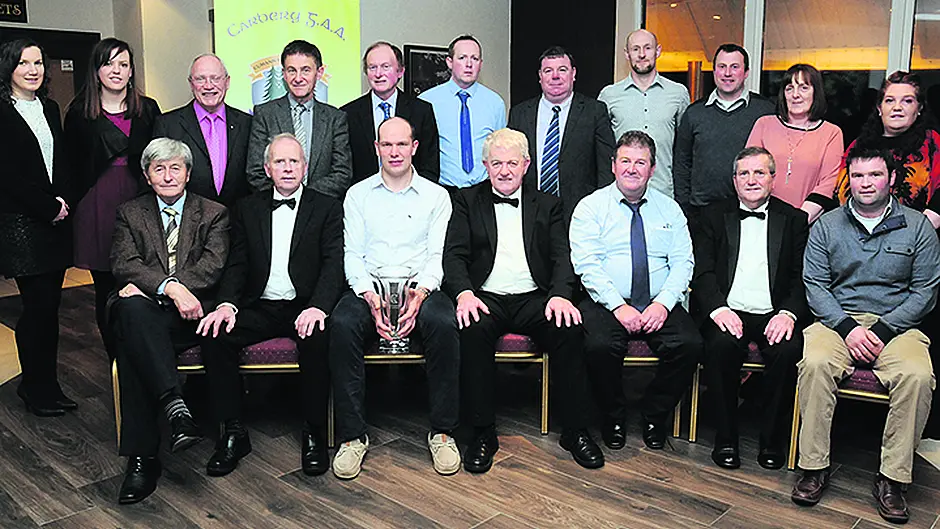Alan O'Connor spoke to KIERAN McCARTHY about why he decided to retire from inter-county football for a second time and why it was an easy decision to make
Alan O’Connor spoke to KIERAN McCARTHY about why he decided to retire from inter-county football for a second time and why it was an easy decision to make
*************
HE still looks every inch an inter-county footballer, all six foot four of him.
With ease, his two giant hands wrapped around the quite large Carbery GAA trophy presented to him at last Friday night’s awards at the Westlodge Hotel, holding it like he plucked a ball from the sky in midfield.
In fighting fit shape, inter-county retirement hasn’t diminished the sheer size of St Colum’s gentle giant – with a chest you’d bounce concrete blocks off – and you realise how much the current Cork football team misses a man of his physical presence.
He was, for a spell, the immovable object, those broad shoulders bounced away challenges like a tennis player returning a serve.
But, 32 years old now, he’s had his fill of inter-county football, retiring after last year’s championship exit. Not a man for fanfare, in typical O’Connor fashion, he made a quiet exit, manager Ronan McCarthy announcing the news in October that he had retired, for a second time.
O’Connor had walked away in the winter of 2013. He was burned out. Ten years of inter-county football, just married, a young family and self-employed, he needed a break.
He was back in 2015, refreshed, and gave his greatest performance in the drawn Munster final that year in Killarney, dominating that colosseum like a Roman gladiator fighting for his survival. Everything was left out there.
Kerry’s best were no match for him that day. It was heroic, Kerry boss Eamonn Fitzmaurice admitting after, ‘He is a lad you would want with you.’
That was the highlight before the second coming ended last year, O’Connor a used sub as Cork, after their finest 80 minutes of Peadar Healy’s two-year reign, finally bent the knee to Mayo in the Gaelic Grounds.
There was a sense that evening that the end was almost here for O’Connor, that the miles and niggles had caught up with him.
‘When you are slightly older, you do realise that you’re coming to an end – that’s why you want to win every game, to make it last longer,’ O’Connor says.
‘After the Mayo game, I thought and I knew that it’s a long journey to get back to the same point the following season.
‘Every game is almost your last game so you take it step by step, game by game.
‘As I prepared for games, I approached it like it was my last, ready to give it everything.
‘When I reflected on it all, a few months after the summer, and thought about my family and work, I knew it was the right time.’
Last season was a slow burner for O’Connor, he felt his way back into the campaign that he admits he had second thoughts about initially.
‘At the start of last year, I was in two minds about going back in to be honest,’ he says.
‘The way it worked out, I did a lot of training back west and it was more of a slow process.
‘I was looking after myself. Instead of playing a lot of league games, the approach was I’d play one or two if I could.
There were a couple of injuries that I needed to get under control so the plan was to be ready for the championship – and to be an option for the team.
‘I was happy with that because these days, inter-county takes over, it’s a single man’s game. If you are in college and have time to rest, it works. It’s not two or three nights a week, it’s four or five with a game the weekend.
‘It’s a lot more demanding on the body, the mind and general life too.
‘It was an ease then when I decided to retire.’
The 2010 All-Ireland winner got to the stage where he realised that the hunger and fight wasn’t what it was. Add in a young family, work commitments and life outside of football, it all made his decision to retire that much easier.
It turns out retiring the second time wasn’t as taxing as the first.
‘It was an easier decision,’ he admits.
‘It takes a lot of pressure off your shoulders, that expectation.
‘You don’t want to leave yourself down and you want to be happy walking away from it. And I was. I know I’ve given it everything I had.’
Retiring for a second time was also made easier because he decided to come out of retirement in 2015. As the years move on, he won’t be hounded by thoughts of ‘what if’.
‘I’ve no regrets – and that’s a good place to be,’ he says.
‘I left no stone unturned. I went back. I gave it everything.
‘If I didn’t go back the second time, maybe I’d have been asking why I didn’t in a few years.
‘Your body starts talking to you too after a while and it does take that bit longer to recover compared to when I was in my 20s.
‘When I came back the second time, I said I’d be honest with myself and honest with the team. I said I’d work hard and see how I’d go. If I was good enough to make the team for the championship, then fair enough. I put myself in a situation where I worked hard and got back into the team. I got rewards, like the Munster final down in Killarney.
‘I enjoyed it, the big days are the days you want to play in and remember.’
Those heady days in heaving stadiums on the big stage may be behind him now – but Cork’s loss is St Colum’s gain, once he gets back on track from an injury to his ring finger on his right hand, an unwelcome parting gift from inter-county football that’s still causing him bother.
‘I had an operation on my finger back in December and I am in the process of getting that sorted,’ he explains.
‘I’ll slowly come back into it again. I’ll see how it goes.
‘I have to see a specialist in Cork. I dislocated it in the Kerry game and I fractured a knuckle then after that in the Mayo game; the knuckle is pinned at the moment.’
He’ll be a key man for Colum’s as usual this year, taking the hard hits and dishing them out, and not complaining.
With Cork, he says, he won a lot but lost a lot too, enjoyed the good days that outweighed the bad days, in the earlier years anyway, and he feels football has made him a better character.
That in mind, how Cork could do with a man of his ilk right now, a thou-shall-not-pass commander, at 6’ 4”, whose actions were louder than words, a presence that made itself felt and who left it all on the line.










